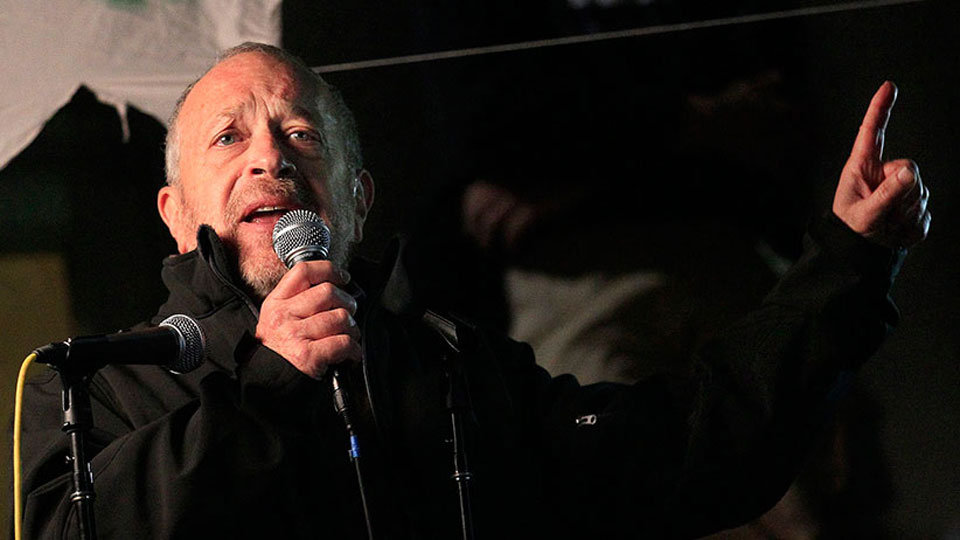
BERKELEY, Calif.—Rising income inequality, to levels unseen for almost a century, makes it “hard to keep an economy” and a democracy going, former Labor Secretary Robert Reich says. Ditto for the U.S. version of the capitalist system, he adds.
Reich, now a professor at the University of California at Berkeley, said the growing chasm between the rich and the rest of us and the resulting middle-class squeeze—especially on the white working class and on rural residents—produces a voter shift towards demagoguery.
“The longer the income ladder, the harder it is for somebody on the bottom to rise up,” he explained. “If there are [income] rungs missing in the middle, it becomes harder and harder for people who are squeezed.”
Those voters, he said, “become less generous and more susceptible to demagogues,” such as defeated GOP White House occupant Donald Trump.
And those demagogues in turn, also paint the “other”—immigrants, the poor, Muslims, and people of color, in Trump’s citations—as the enemy, Reich said.
Meanwhile, “The U.S. is moving towards that same oligarchic system” some other nations sport, “given the very close connection between wealth and political power.”
Reich spoke Nov. 16 as part of a continuing series of Zoom talks sponsored by the National Press Foundation, an arm of the D.C.-based National Press Club on covering the issues of race, class, poverty, and income inequality.
There’s no question, he pointed out, the gap between the 1% and everyone else has turned into a vast chasm in the last 40 years. Both parties have been responsible for creating the abyss, he said.
The Republicans do so via tax cuts for corporations and the rich, demagoguery, and covering up their real goals—enriching the influential wealthy—with populist rhetoric.
But the Democrats also do so by abandoning working-class voters in favor of the college-educated of all races and sexes, a point that shows up in charts of election returns Reich presented. That includes the 2020 election, he noted.
He noticed the same trend as he toured the country during his term as Democratic President Bill Clinton’s first Labor Secretary. Clinton was a pro-business Democrat who pushed, among other ideas, so-called “free trade” treaties, notably NAFTA.
Workers “in the South and in the Rust Belt would say to me” even then, a quarter of a century ago, ‘I’m working harder than ever. Why am I not getting ahead?’ And that’s even with “more women entering the workforce because they had to.”
But the 2020 vote reinforced another divide within the U.S.: between the wealthy central cities, their suburbs and coastal areas East and West on one side, and the interior of the country on the other. Reich posted a graphic which showed coastal cities and suburbs are blue and getting bigger and bluer.
The interior, except for big blue clusters around Chicago, the Twin Cities, Denver, several Texas cities, and some smaller metro areas, is losing people and getting redder—more Republican. In essence, he mused, the two major parties have flipped their electorates, with the GOP now representing non-college graduates and the Democrats the college grads.
But Reich, author of 18 books, including the most recent, The System: Why It’s Rigged And How To Fix It which looks in depth at the gap and the resulting political impact, says the problem isn’t just individual demagogues such as Trump or politicians who catered to rich campaign contributors. It’s the system itself.
That’s because the U.S. economic system is not capitalism in pure form, but, in a phrase he’s used before, “socialism for the rich,” and so-called free-market capitalism for everyone else.
And that “capitalism” is skewed by the rich and by corporate political clout, using their gains to further their own benefit, he added. The 1%, he noted, “now own half of the stock market.” They use those piles of wealth, garnered from the rest of us, to rule politics.
“Money is now attempting to drive public opinion,” Reich declared, citing as evidence the $207 million Uber and Lyft and other gig firms spent on a California referendum to overturn AB5, the state law that declared gig workers are “employees” under labor law, entitled to full worker rights.
Uber, Lyft, and their corporate allies won, meaning those workers now revert to being “independent contractors,” with virtually no rights at all.
Meanwhile, the groups on the bottom slid ever more deeply into the abyss. Much of that has to do with the legacy of racism and slavery, which left people of color more vulnerable to economic disaster, a condition magnified by the coronavirus pandemic.
The one question Reich could not completely answer is how to reverse those trends and start closing the wealth gap and the income gap. He advocated more education of the working class, both white and people of color, to convince them of their common interests against the exploitation by the 1%.
He also said the Democrats, having presumably retaken the White House under former Vice President Joe Biden, will have to move to meet the expectations of workers, not the rich. Biden could use executive orders and regulatory changes to reverse much, but not all, of Trump’s damage—including damage the Trump Labor Department has inflicted on workers.
But if Biden doesn’t, or if a GOP-run Senate stymies his plans for comprehensive reform—“Building Back Better,” Biden calls it—the way is open for an alternative third party to step into the void of resulting mistrust and despair.
Otherwise, Reich warned, there would be even more turns to demagoguery and scapegoating, and further movement towards oligarchy.
Quoting famed Supreme Court Justice Louis Brandeis, who was a pro-worker labor lawyer before joining the High Court, Reich added: “Either we can have great wealth in the hands of a few, or we can have democracy. We cannot have both.”










